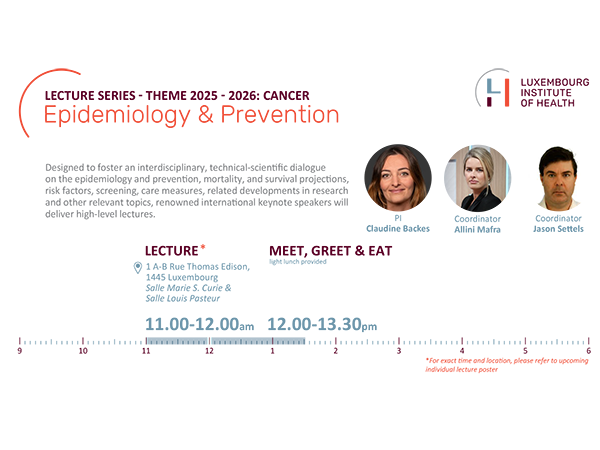- Domaines || de recherche
- Recherche Translationnelle
- Médecine translationnelle transversale (MTT)
- Centre opérationnel de médecine translationnelle (TMOH)
- Service Gestion de projets cliniques (CPMO)
- Centre d'investigation clinique & épidémiologique
- Centre de recherche clinique & translationnelle du Luxembourg (LCTR)
- Biobanque intégrée du Luxembourg (IBBL)
- Disease Modeling & Screening Platform (DMSP)
- Centre du génome Luxgen
- Plateforme de recherche en pathologie (RPP)
- Projets de Recherche
et essais cliniquesSoutenez-nous - Recherche Translationnelle
🇬🇧 Why do young people die from anaphylaxis?
27/06/2024 11:00 à 14:00
- Lecture Series Infection & Immunity
Veuillez noter que le contenu n’est disponible qu’en anglais.
Speakers

Prof. Paul
Turner
Turner
Clinical Reader in Pediatric Allergy & Immunology,
Imperial College London, UK
Hon. Consultant in Paediatric Allergy & Immunology,
Imperial College Healthcare NHS Trust
Abstract
Anaphylaxis is a serious systemic hypersensitivity reaction that is usually rapid in onset and may cause death. Anaphylaxis is not uncommon, with an estimated lifetime prevalence of 1:1000. At least 80% of anaphylaxis reactions resolve without treatment, however, fatal cases do occur, with an incidence of around 1:250,000. Fatality rates are lowest in infants, increasing in adolescence and remaining high throughout early-mid adulthood. Why young people are most at risk of severe reactions is unclear. Arguably, the biggest gap in managing patients at risk of anaphylaxis is our inability to predict who is at risk of severe reactions.
Understanding the pathophysiology of anaphylaxis can inform the optimal treatment for anaphylaxis and anaphylactic shock, and may help elucidate risk factors for severe reactions. In this lecture, Dr Turner will review current knowledge, and explain how recent data are informing guidelines and clinical practice to reduce the impact of anaphylaxis on affected individuals and their families.
Responsible Scientist
Annette
Kuehn
Kuehn
*Please note that registration is mandatory by sending an email to carole.weis@lih.lu or michelle.roderes@lih.lu.
LOCATION
House of BioHealth
Conference Room (ground floor 0)
29, rue Henri Koch, L-4354 Esch-sur-Alzette
LECTURE: 11:00am – 12:00pm
MEET & EAT
12:30pm – 2:00pm
House of BioHealth
Salle Françoise Barré Sinoussi
29, rue Henri Koch, L-4354 Esch-sur-Alzette
Light lunch provided – Registration mandatory*
Supported by:

Protection des données
En savoir plus sur la « Notice sur la protection des données : traitement des données personnelles dans le cadre de la gestion des événements ».



